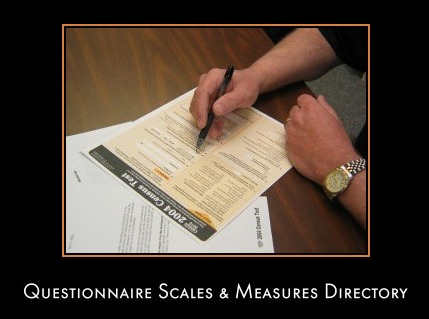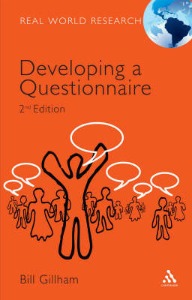|
Questionnaire Scales & Measures DirectoryQuestionnaire Scales & Measures Directory
(Photo Credit: U.S Census Bureau) Thinking About Becoming A Psychology Student?
Find A Psychology School Near You
Welcome to The Questionnaire Scales & Measures Directory, a work in progress initiative here on the All About Psychology Website. The aim of the directory is to produce a comprehensive resource for anybody looking for an appropriate scale or measure that can be freely used within research questionnaires and surveys. I hope that students will find the directory particularly useful as I know from personal experience as both an undergraduate/graduate psychology student and a research project supervisor that finding appropriate data collection measures can be a very frustrating and time consuming process. With this in mind, all the scales and measures featured in the directory will include a General Description of the scale/measure as well as a direct access and further information link. As the directory grows instruments will eventually be arranged within appropriate categories e.g., anxiety measures, stress measures etc. Help Build The Directory If you know of a scale or measure that can be freely used which isn't currently featured within the directory; I'd be very grateful if you could provide me with the details via the following link. Psychology Website Contact Form The Cognitive Emotion Regulation Questionnaire (CERQ)A measure cognitive coping strategies, developed by Dr. Nadia Garnefski and Dr. Vivian Kraaij. The Cognitive Emotion Regulation Questionnaire (CERQ) is a multidimensional questionnaire constructed in order to identify the cognitive emotion regulation strategies (or cognitive coping strategies) someone uses after having experienced negative events or situations. Contrary to other coping scales that do not explicitly differentiate between an individual's thoughts and his or her actual actions, the present measure refers exclusively to an individual's thoughts after having experienced a negative event. The CERQ is a very easy to administer, self-report scale consisting of 36 items. The questionnaire has been constructed both on a theoretical and empirical basis and measures nine different cognitive coping strategies. The CERQ makes it possible to identify individual cognitive strategies and compare them to norm scores from various population groups. In addition, the scale offers the opportunity to investigate relationships between the use of specific cognitive coping strategies, personality variables, psychopathology and other problems. The CERQ can be administered in normal populations and clinical populations, in different agegroups. The CERQ can be used to measure someone's general cognitive style as well as someone's cognitive strategy after having experienced a specific event. Separate versions for adults, adolescents and children as well as a short 18-item version have been developed. All of these versions are available in Dutch and English. The CERQ can be used for research and diagnostic purposes. See following link for full details and to get hold of The Cognitive Emotion Regulation Questionnaire. The Perceived Stress Scale (PSS)Originally published in 1983, The Perceived Stress Scale (PSS) is now one of the most widely used psychological instruments for measuring the perception of stress. The scale was developed to to measure of the degree to which situations in one’s life are appraised as stressful. The Perceived Stress Scale is not a diagnostic instrument, it has, however, been employed in a variety of research contexts, including: studies which assess the stressfulness of situations, the effectiveness of stress-reducing interventions and investigations into the extent to which there are associations between psychological stress and psychiatric and physical disorders. See following link (under scales) for full details and to get hold of The Perceived Stress Scale. Satisfaction With Life Scale (SWLS)The Satisfaction With Life Scale is a short 5-item instrument designed to measure global cognitive judgments of satisfaction with one's life. The scale usually requires only about one minute of a respondent's time. The scale is in the public domain (not copyrighted) and therefore you are free to use it without permission or charge by all professionals (researchers and practitioners) as long as you give credit to the authors of the scale: Ed Diener, Robert A. Emmons, Randy J. Larsen and Sharon Griffin as noted in the 1985 article in the Journal of Personality Assessment. See following link for full details and to get hold of The Satisfaction With Life Scale. Scale of Positive and Negative Experience (SPANE)The Scale of Positive and Negative Experience is a 12-item measure which includes six items to assess positive feelings and six items to assess negative feelings. For both the positive and negative items, three of the items are general (e.g., positive, negative) and three per subscale are more specific (e.g., joyful, sad). The scale is copyrighted but you are free to use it without permission or charge by all professionals (researchers and practitioners) as long as you give credit to the authors of the scale: Diener, E., Wirtz, D., Tov, W., Kim-Prieto, C., Choi. D., Oishi, S., & Biswas-Diener, R. (2009). New measures of well-being: Flourishing and positive and negative feelings. Social Indicators Research, 39, 247-266. See following link for full details and to get hold of The Scale of Positive and Negative Experience. The Scale of Positive and Negative Experience The Flourishing Scale (FS)The Flourishing Scale consists of eight items describing important aspects of human functioning ranging from positive relationships, to feelings of competence, to having meaning and purpose in life. The scale was called Psychological Well-being in an earlier publication, but the name was changed to more accurately reflect the content because the scale includes content that goes beyond psychological well-being narrowly defined. The scale is copyrighted but you are free to use it without permission or charge by all professionals (researchers and practitioners) as long as you give credit to the authors of the scale: Diener, E., Wirtz, D., Tov, W., Kim-Prieto, C., Choi. D., Oishi, S., & Biswas-Diener, R. (2009). New measures of well-being: Flourishing and positive and negative feelings. Social Indicators Research, 39, 247-266. See following link for full details and to get hold of The Flourishing Scale. The Zimbardo Time Perspective Inventory (ZTPI)Developed by Philip Zimbardo & J.N. Boyd The Zimbardo Time Perspective Inventory is a self-reported test made up of 56 items. It investigates how people project themselves in the time, according to their orientation (to past, present and future) and attitudes (positive, negative, fatalistic or hedonistic). The Zimbardo Time Perspective Inventory has been used in various field of research and applications, such as academic achievement, risk-taking, drug use, subjective well-being, quality of life, illness, social relations, burnout, health preventive behaviors, post traumatic stress disorders (PTSD), clinical settings and health communications. The ZTPI is a public domain research instrument and may be used free of charge for non commercial applications. See following link for full details and to get hold of The Zimbardo Time Perspective Inventory. The Zimbardo Time Perspective Inventory Recommended ReadingDeveloping A Questionnaire by Bill Gillham
Book Description Developing a Questionnaire: 2nd Edition is a comprehensive guide to the successful design and implementation of questionnaires as a research method. It covers: The second edition also contains new chapters on the use of questionnaires in surveys, face-to-face questionnaires and telephone interviews. See following link for more details: Developing a Questionnaire (Real World Research) Classic Articles All Psychology Students Should Read
This special Kindle collection consists of the most influential, infamous and iconic research articles ever published in the history of psychology. See following link for full details. The Psychology Classics Kindle Collection Go From Questionnaire Scales & Measures Back To The Home Page
|


